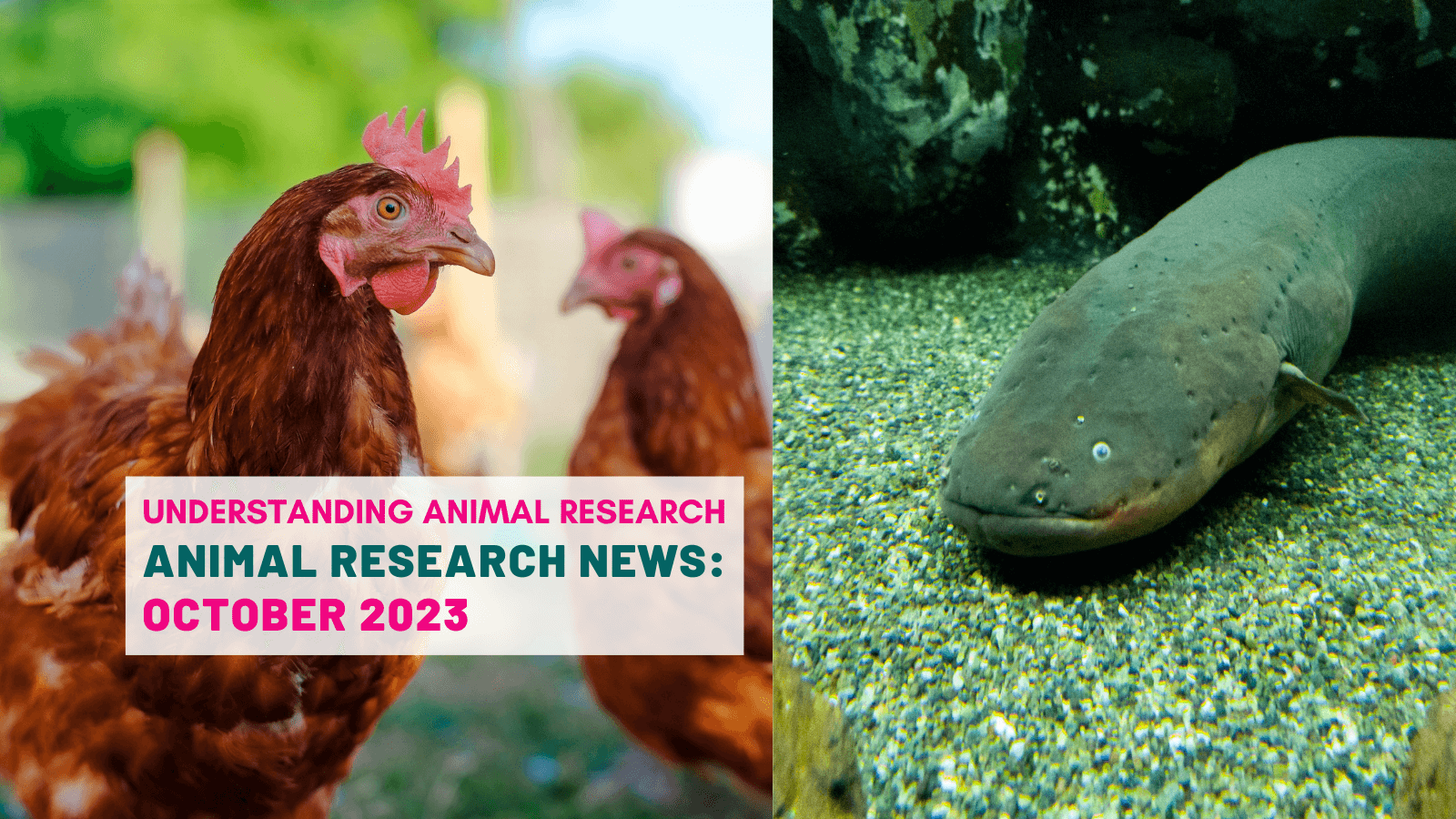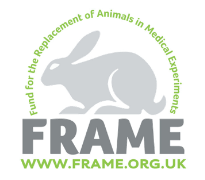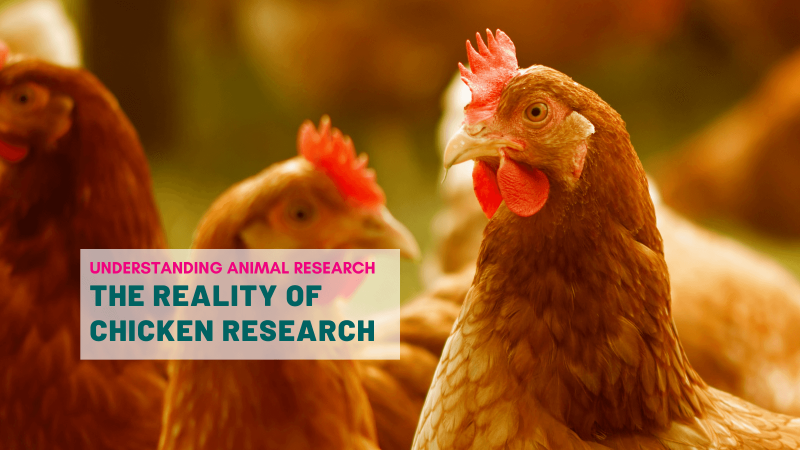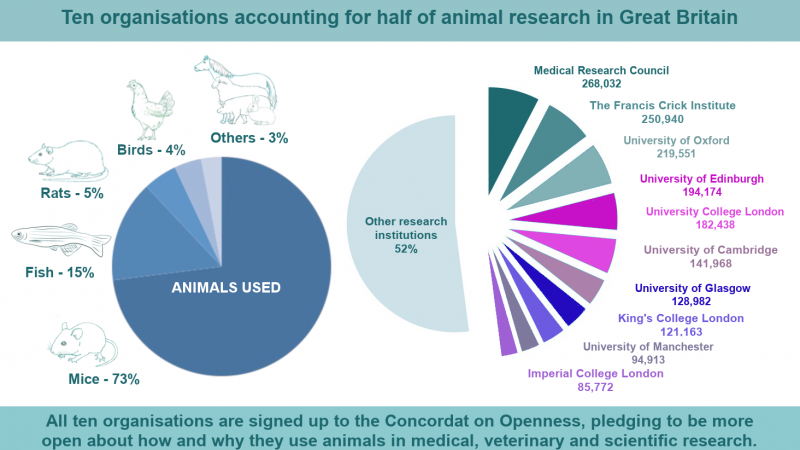
A selection of recent research and news from UAR members and Concordat signatories.
Animal Research in the Papers
University of Edinburgh's Roslin Institute and Imperial College London
World’s first flu-resistant chickens could pave way for gene-edited UK poultry
Scientists have created flu-resistant chickens through gene editing, marking a breakthrough in the fight against avian flu. By altering the ANP32A gene in chickens, researchers at the University of Edinburgh's Roslin Institute and Imperial College London made the birds highly resistant to avian flu, with nine out of ten birds showing no signs of infection when exposed to the virus. However, the researchers caution that infections were not completely blocked, which must be achieved before introducing gene-edited chickens to farms to prevent the virus evolving to become more dangerous to humans. Preliminary results suggest editing three genes, rather than just one, could prevent breakthrough infections.
Read the article: Guardian.com
Read the paper: Creating resistance to avian influenza infection through genome editing of the ANP32 gene family
UCL and UK DRI
Scientists discover how neurons die in Alzheimer’s disease
 In a breakthrough study, researchers at the UK Dementia Research Institute at UCL and VIB-KU Leuven, have uncovered a crucial mechanism in Alzheimer's disease: necroptosis, a programmed cell death, is triggered in neurons when they are exposed to amyloid plaques and tau tangles, the disease's hallmark proteins. The team demonstrated that by reducing an RNA gene called MEG3 and preventing necroptosis, neuron death can be prevented. To better understand Alzheimer's, they created a unique model by implanting both
In a breakthrough study, researchers at the UK Dementia Research Institute at UCL and VIB-KU Leuven, have uncovered a crucial mechanism in Alzheimer's disease: necroptosis, a programmed cell death, is triggered in neurons when they are exposed to amyloid plaques and tau tangles, the disease's hallmark proteins. The team demonstrated that by reducing an RNA gene called MEG3 and preventing necroptosis, neuron death can be prevented. To better understand Alzheimer's, they created a unique model by implanting both  human and mouse neurons into mouse models. Surprisingly, only the human neurons, and not their rodent counterparts, displayed features of Alzheimer’s disease which is seen in the brains of patients, including tau tangles, and significant neuronal cell loss. This human-specific aspect of Alzheimer's may offer new insights into potential therapies for the condition, in addition to the traditional focus on amyloid and tau pathologies.
human and mouse neurons into mouse models. Surprisingly, only the human neurons, and not their rodent counterparts, displayed features of Alzheimer’s disease which is seen in the brains of patients, including tau tangles, and significant neuronal cell loss. This human-specific aspect of Alzheimer's may offer new insights into potential therapies for the condition, in addition to the traditional focus on amyloid and tau pathologies.
Read the articles: BBC.co.uk, UCL.ac.uk, UKDRI.ac.uk, UKRI.org
Read the paper: MEG3 activates necroptosis in human neuron xenografts modeling Alzheimer’s disease
Nobel Prize in Physiology or Medicine 2023
Discoveries concerning nucleoside base modifications that enabled the development of effective mRNA vaccines against COVID-19
The 2023 Nobel Prize in Physiology and Medicine was jointly awarded to Katalin Karikó and Drew Weissman for their discoveries concerning nucleoside base modifications, which involved mice. Through their ground-breaking findings, which fundamentally changed our understanding of how mRNA interacts with our immune system, the laureates contributed to the unprecedentedly rapid development of effective mRNA vaccines  against COVID-19 during one of the greatest threats to human health in modern times.
against COVID-19 during one of the greatest threats to human health in modern times.
Read our article: The animal research behind the 2023 Nobel Prize in Physiology or Medicine
Read advanced information on the study: Nobelprize.org
Read more on COVID-19 and animal research
Medical Research
University of Oxford
New ‘droplet battery’ could pave the way for miniature bio-integrated devices
Researchers at the University of Oxford have developed a miniature “droplet battery”, inspired by electric eels, that could be used to power tiny devices implanted into human tissue. The new technology uses internal ion gradients to generate an ionic current. The droplet battery can store energy for more than 24 hours and has so far shown that it can modulate neuronal network activity in 3D neural microtissues and ex vivo mouse brain slices, potentially enabling integration into living organisms.
Read the article: Ox.ac.uk
Read the paper: A microscale soft ionic power source modulates neuronal network activity
University of Cambridge
New vaccine technology could protect from future viruses and variants
 A groundbreaking vaccine technology developed by the University of Cambridge and DIOSynVax has shown the potential for a single antigen to provide broad protection against various coronaviruses. Studies using mice, rabbits, and guinea pigs found that this digitally designed antigen, which targets critical regions of the virus needed for replication, generated a strong immune response against multiple coronaviruses, including SARS-CoV-2 variants. Human clinical trials are currently underway in Southampton and Cambridge. Unlike traditional vaccines, which are strain-specific, this approach aims
A groundbreaking vaccine technology developed by the University of Cambridge and DIOSynVax has shown the potential for a single antigen to provide broad protection against various coronaviruses. Studies using mice, rabbits, and guinea pigs found that this digitally designed antigen, which targets critical regions of the virus needed for replication, generated a strong immune response against multiple coronaviruses, including SARS-CoV-2 variants. Human clinical trials are currently underway in Southampton and Cambridge. Unlike traditional vaccines, which are strain-specific, this approach aims
to protect against a wide variety of future coronavirus variants, offering a significant advance in vaccine technology.
Read the article: Cam.ac.uk
Read the paper: A computationally designed antigen eliciting broad humoral responses against SARS-CoV-2 and related sarbecoviruses
Babraham Institute
3D genome analysis reveals secrets to antibody diversity
 Researchers at the Babraham Institute have used 3D genome analysis to uncover a mechanism in B cells of mice that organises unique DNA associations, allowing genes that are physically distant from each other to come together and generate diverse antibodies. Each B cell folds its genome differently, offering myriad ways to combine genes into unique orders for antibody creation. This discovery sheds light on how B cells generate millions of antibodies with various specificities. Understanding this process may explain why antibody diversity declines with age and could lead to interventions to address this issue for better health in later life.
Researchers at the Babraham Institute have used 3D genome analysis to uncover a mechanism in B cells of mice that organises unique DNA associations, allowing genes that are physically distant from each other to come together and generate diverse antibodies. Each B cell folds its genome differently, offering myriad ways to combine genes into unique orders for antibody creation. This discovery sheds light on how B cells generate millions of antibodies with various specificities. Understanding this process may explain why antibody diversity declines with age and could lead to interventions to address this issue for better health in later life.
Read the article: Babraham.ac.uk
Read the paper: Intra- and interchromosomal contact mapping reveals the Igh locus has extensive conformational heterogeneity and interacts with B-lineage genes
UK DRI and Imperial College London
Study reveals key difference between mice and humans in marker of inflammation
 A study at the UK Dementia Research Institute (UK DRI) at Imperial College London challenges the widely held belief that translocator protein (TSPO), a marker of inflammation, accurately reflects neuroinflammation and microglia activation in humans. Using human brain tissue from donors with neurodegenerative diseases and mouse models, the researchers discovered that human microglia do not
A study at the UK Dementia Research Institute (UK DRI) at Imperial College London challenges the widely held belief that translocator protein (TSPO), a marker of inflammation, accurately reflects neuroinflammation and microglia activation in humans. Using human brain tissue from donors with neurodegenerative diseases and mouse models, the researchers discovered that human microglia do not increase TSPO expression in response to inflammation, in contrast to mice. Instead, increased TSPO in human brain tissue may signify a higher density of microglia and other inflammatory cells. This finding alters the
increase TSPO expression in response to inflammation, in contrast to mice. Instead, increased TSPO in human brain tissue may signify a higher density of microglia and other inflammatory cells. This finding alters the
interpretation of decades of studies using TSPO PET imaging in humans, highlighting the need for a new
approach to imaging inflammation.
Read the article: UKDRI.ac.uk
Read the paper: Translocator protein is a marker of activated microglia in rodent models but not human neurodegenerative diseases
King’s College London
Discovery of heart cell mechanism holds promise for future heart failure treatments
A study from King’s College London has uncovered a biological mechanism within heart muscle cells linked to heart failure, a leading cause of mortality in developed countries. Researchers removed an enzyme, iPLA2b, from cardiac muscle cells in mice and, surprisingly, the hearts remained healthy under stress-inducing conditions. iPLA2b generates lysophosphatidylserine, a lipid molecule that binds to a receptor on cardiac muscle cells. Reducing the presence of this receptor resulted in less cell necrosis. This discovery could offer a new target for heart failure therapies. However, iPLA2b removal in mice was associated with other health issues, requiring further research to harness its potential for treatments.
Read the article: KCL.ac.uk
Read the paper: Lysophosphatidylserine induces necrosis in pressure overloaded male mouse hearts via G protein coupled receptor 34
Babraham Institute
Cancer-causing mutations transform the architecture of a key growth-promoting signalling pathway
In a study using mouse models, researchers at the Babraham Institute have uncovered a unique mechanism in prostate cancer cells that drives cell growth independently of typical growth cues and regulators. This discovery could have implications for potential therapeutics in prostate cancer and other cancer types by providing molecular targets for drugs to halt tumour progression.
The PIP3/PI3K signalling pathway is one of the most important signalling mechanisms in our cells, affecting cell metabolism and growth. It is also one of the most frequently altered pathways in human cancer. The researchers identified that PI3K pathway hyperactivation due to loss of the tumour suppressor PTEN causes both a sustained increase in pathway activity and significant pathway reconstruction. This knowledge could lead to the development of drugs that target cancer cells while sparing healthy cells.
Read the article: Babraham.ac.uk
Read the paper: PLEKHS1 drives PI3Ks and remodels pathway homeostasis in PTEN-null prostate
Animal Welfare and 3Rs Research (replace, refine, reduce)
University of Bristol and the NC3Rs
Could measuring ultrasonic vocalisations help refine rat welfare?
Researchers, led by Professor Emma Robinson at the University of Bristol, have received over £500,000 in funding from the NC3Rs for a study aiming to measure rat welfare using ultrasonic vocalisations. This novel approach intends to assess the impact of refinement methods on rats' welfare without removing them from their home cages. The study will investigate whether two 
refinement techniques improve rat welfare, as reflected in their vocalisations.
Professor Robinson said: "We hope our study will show that by measuring rats' ultrasonic vocalisations it will provide a simple and easy-to-use method to evaluate refinements. Our approach will not require costly equipment or specialist expertise meaning it could be readily set-up and utilised within any animal research facility."
This non-invasive, cost-effective method could help researchers assess emotional states in rats, facilitating the implementation of refinements in animal research while maintaining animal well-being.
Read the article: Bristol.ac.uk
Sector News
University of Manchester, UAR, The RSPCA, and FRAME
Leading thinkers debate rights and wrongs of animal research
Some of the leading thinkers on different sides of the debate around animal research are to take on the issue in front of University of Manchester staff and students in a live event at the Whitworth Hall on 28 November, between
The audience at the event, called Culture of care or culture of concern: let’s debate animal research, will put questions to a panel.
 On the panel is Wendy Jarrett, CEO of Understanding Animal Research (UAR), Penny Hawkins, Head of the Animals in Science Department, RSPCA Science and Policy Group and Celean Camp, CEO of the Fund for the Replacement of Animals in Medical Experiments (FRAME).
On the panel is Wendy Jarrett, CEO of Understanding Animal Research (UAR), Penny Hawkins, Head of the Animals in Science Department, RSPCA Science and Policy Group and Celean Camp, CEO of the Fund for the Replacement of Animals in Medical Experiments (FRAME).
The panel will be by chaired by Mike Addelman, communications lead for animal research at The University of Manchester. He said: “For centuries, scientists have worked with animals to help answer some of the most important questions in biomedical science. But nowadays, more than 100 million animals are used in research across the world every year. And though the UK sector is the most tightly regulated in the world, some of those animals still experience pain, suffering and distress.”
every year. And though the UK sector is the most tightly regulated in the world, some of those animals still experience pain, suffering and distress.”
He added: “So what’s the future for animal research? Are we able to replace it with more humane alternatives? And how important is a culture of care, not just to the animals themselves, but also the people who work with them?”
Read the article: Manchester.ac.uk
Read more monthly news round ups.
Last edited: 27 November 2023 15:14



